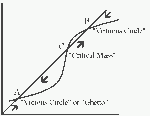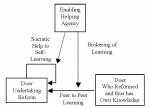This article examines the “economic” arguments put forward in favor of voucher privatization and it gives an institutional analysis of how the investment funds might be expected to behave in spite of expectations seen through rose-colored glasses. As one of the “great” social experiments of the late 20th century, some lessons for the future are drawn.
Mixing Truth & Power: A Guest Editorial
After the dissent-motivated departures of Joseph Stiglitz, Ravi Kanbur, and now Bill Easterly, even “the most casual observer” can begin to “connect the dots” and see that the Bank is having a problem handling dissent and criticism coming from internal sources. This editorial in the World Bank Staff Association Newsletter traces the problem to the organizational stance of taking “Official Views” on the complex questions of development–thereby mixing power and truth to the detriment of the latter.
Getting the bugs out of the Knowledge Bank
This note argues that the World Bank should base the Knowledge Bank on the way human learn, not the way insects learn.
World Bank survey paper on migration
This survey of the literature on migration and development was my last written product before retiring from the World Bank. But the results of years of documented experience is that migration leads to poverty alleviation (remittances) but not development. This is not the message that the Bank wants to hear so the results are largely ignored.
Should Development Agencies Have Official Views?
The major development agencies have ex cathedra “Official Views” (with varying degrees of explicitness) on the complex and controversial questions of development. At the same time, knowledge is now more than ever recognized as key to development—in the idea of a “knowledge bank” or knowledge-based development assistance. I argue that these two practices are in direct conflict—much as making Lysenko’s views as “Official Soviet Science” was in conflict with the progress of the science of genetics in the Soviet Union. When an agency attaches its “brand name” to certain Official Views, then it is very difficult for the agency to also be a learning organization or to foster genuine learning in the clients.
Helping People Help Themselves: Towards a Theory of Autonomy-Compatible Help
This is a presis of my book Helping People Help Themselves: From the World Bank to an Alternative Philosophy of Development Assistance. (U. of Michigan Press, 2005) I explore several principles or themes of a theory of autonomy-compatible assistance and show how these themes arise in the work of various authors in rather different fields.
Jane Jacobs on the Nature of Development
Jane Jacobs is best known as a writer about cities and as a vigorous critic of urban planning. The purpose of this paper is to suggest that she should be read as a writer on economic development who focuses on cities as the principal sites of development. The recently upsurge of interest in migration policies and development is taken as the entry point into her work, e.g., to explain why “poverty reduction” through remittances will tend to be nondevelopmental. Her ecologically-inspired “tangled bank” conception of development as growth through differentiation is used to elucidate a number of developmental issues. It also shows how the “spin-off conundrum” of multiproduct diversification is important to industrial development policies. Several examples are outlined of how that problem has been approached.
Review of Thomas Dichter’s “Despite Good Intentions: Why Development Assistance to the Third World has Failed”
Development in Practice. August 2003.
Rethinking Development Assistance: An Approach Based on Autonomy-Respecting Assistance
Today, development agencies are actively rethinking the effectiveness of development assistance. There have been many small or local successes but the goal of sustainable scaling-up has been more illusive. What are the linkages that can be changed by policy-makers that will help scale up micro-successes to have an impact at the macro level? This paper argues that autonomy-respecting assistance both in the cognitive and volitional dimensions is the sort of macro-micro development linkage that will best support not only genuine reforms but the scaling up of those reforms.
The Indirect Approach
Aid and conditionalities are the “carrots and sticks” of the conventional direct approach to fostering economic development. The economic theory of agency is the most sophisticated theoretical treatment of the direct carrots and sticks approach to influencing human behavior. In view of the outcomes of the conventional approach, it might be worthwhile to explore alternative indirect approaches that focus on enabling clients to act more autonomously rather than overriding or undercutting the clients’ actions (or “agents’ behavior”) with improved “carrots and sticks.” Are there inherent limitations on the direct approach that will not be solved with better crafted “agency contracts” or closer monitoring of the agents? This paper traces the intellectual history of indirect approaches from Socrates to modern thinkers such as Wittgenstein, Gandhi, and McGregor. One of themes is that constructivist and active learning pedagogies constitute an indirect approach wherein the teacher does not directly transmit knowledge to the learner through training and instruction. These pedagogies translated into social and economic development viewed as learning-writ-large form the basis for an alternative indirect approach to fostering development.








